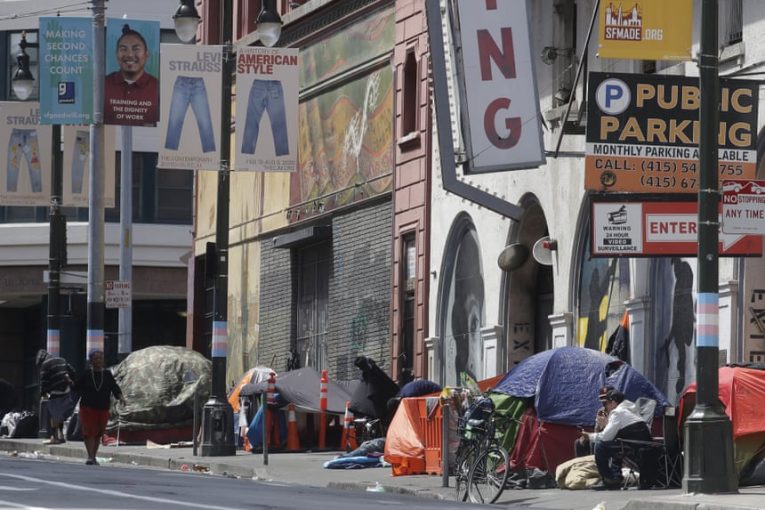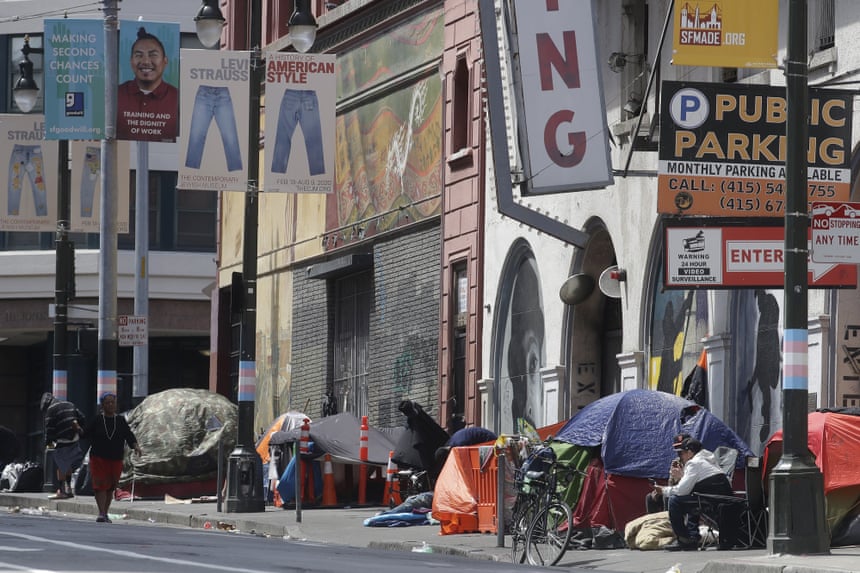

By Rory Fleming
Michael Shellenberger is the archetypal “I don’t have any credentials but I am going to write books about shit I don’t know about” journalist. After getting a Bachelor’s degree in Peace and Global Studies from a small liberal arts college in Indiana and a Master’s in Cultural Anthropology from UC Santa Cruz, he worked for a set of ethically questionable “environmental advocacy” outfits. However, he became upset by environmentalism supposedly turning into a secular religion that sees capitalism as antithetical to its mission. In other words, he became a conservative hack who gets called by Republicans in Congress as an “expert” to shill for a political agenda.
Nonetheless, his new book, San Fransicko: Why Progressives Ruin Cities, dropped at exactly the right time to matter. Many residents who may otherwise identify as progressive have openly declared they care more about their peace of mind than the right of homeless people to exist. Mayor London Breed has been openly hostile towards progressive DA Chesa Boudin since even before he was elected, but just upped the ante by declaring a bold new drug war in the Tenderloin. Supposedly progressive city supervisors like Matt Haney and Hillary Ronen voted to approve that policy, with some naive caveats about not wanting an increase in police funding. The book is selling quite well.
With Shellenberger declaring San Francisco the nation’s shame, other carceral chickens are coming home to roost. He recently hosted one, David M. Kennedy, on a podcast-style call.
The name David Kennedy used to define violence prevention programs. He invented a strategy for alternating threats and offers of social services to gang members in an attempt to convince them to stop shooting guns at each other. His notoriously spiny personality, combined with a startling lack of will to explain the costs and benefits of his strategy — second-class citizenship and heightened surveillance in impoverished Black neighborhoods in exchange for less homicides — led activists on the left to try to cancel him for being an alleged proponent of racist policing. They seem to have largely succeeded: when President Biden announced the grant of over one billion dollars for funding in this area, his name and institute were meticulously absent.
Shellenberger is too busy gawking at homeless people who use drugs to be concerned with real crimes and actual victims. But Kennedy meets him halfway with his so-called Drug Market Intervention. It works essentially the same way as Ceasefire, but addresses much less serious criminal activity. The goal is to “close” open air drug markets, except in practice the markets seem to simply move or become diffuse.
DMI was piloted in High Point, North Carolina first. While the National Institute of Justice’s CrimeSolutions portal ranks that implementation of DMI as “effective,” that is based on a single study: one where Kennedy himself is a named author. One other study was mentioned but “did not meet CrimeSolutions.gov criteria for inclusion in the overall program rating.” In other words, Kennedy patted himself on the back and gave himself an A. Then, when Kennedy tried to import the program in other cities, research published in Criminology & Public Policy shows that DMI repeatedly failed to meaningfully reduce crime.
The conversation between Shellenberger and Kennedy is interesting, because it is clear Shellenberger doesn’t get the basic theoretical underpinnings of crime prevention work. The tabloid hack focuses on the wrong things, declaring in disgust that there are 25,000 injection drug users in San Francisco. Meanwhile, Kennedy explains that the problem with open air drug markets, like the one apparently located in the Tenderloin, is not “drug use as such, it’s what economists would call the externalities.” He describes chaos and violence that can come out of these markets, as well an alleged “raw toxicity,” whatever that means.
But none of this is very convincing from Kennedy, a man who has made a famous career out of allegedly preventing violence. Why spend your focus on indirectly addressing violence when you can directly address it? And why focus on a city that has a lower rate of homicides, rapes, and aggravated assaults than the California average? Clearly, because public drug use and sales hurt people’s feelings — Kennedy does not talk about drugs when they are done in private. And the Mecca of alarmed rich people of ethnic backgrounds that do not get disproportionately targeted by the police is none other than San Francisco.
The use of focused deterrence strategies like Kennedy’s also relies on the assumption that the people receiving intervention are fully rational actors. Gang members are rational actors since gangs are basically businesses with a corporate-style hierarchy. The drug scene is different. Many people who sell drugs also use drugs. In his diatribe, Kennedy states that the people who engage in open-air drug markets are buyers and sellers who don’t have social connections and can’t do their business in any other way. Often, people with no social connections are people who are too mentally disordered to keep social connections.
Shellenberger is now a significant influencer on the way people see San Francisco. Hopefully, this podcast episode is not a sign that Mayor Breed hopes to bring Drug Market Intervention to her city. She could probably get funding for it, but studies show it’s effectively useless in doing what she wants to do. Meanwhile, its failure would exacerbate what Breed is most afraid of: not the further marginalization of her most vulnerable residents, but the risk of FOX News calling the city that she leads a “shithole.”
Rory is a writer and licensed attorney.

There’s a lot more news outlets than just Fox calling San Francisco a schithole.
Do a Google search, you’ll find 216,000 results.
Mr. Fleming’s relentless ad hominems detract from any point he might be trying to make. I personally feel that his columns are juvenile and serve little purpose on the Vanguard. I suggest you stop publishing them.
It doesn’t happen often but I fully agree with Don Shor here.
When AM & DS agree on something . . . thanks for ‘relentless ad hominems’ — I was trying to come up with a phrase for this ‘style’ and DS nailed it.
It is also entertaining how his articles take 1-3 paragraphs of shoe gazing political grandstanding to even start in on the subject of the article – which anyone who took Journalism 1A knows is the opposite of how you catch a reader’s attention.
I read these for the humor value.
So now the Vanguard considers such trashy, name-calling rants by an attorney both ‘journalism” AND “Breaking news?”
And talk about elitism! Using “a small liberal arts school in Indiana” as a pejorative to attack someone who has a different view? There are many extremely good liberal arts schools in Indiana, and throughout the U.S.A.
I wonder how the Vanguard would have reacted if Mr. Fleming had tried to discredit someone because they had graduated from a “historically black, liberal arts school in the South.”
The pic accompanying this article certainly looks like a schithole.
Are those comparable in an mathematical equation? To exist you say . . . that is quite a statement
You know Alan it’s interesting you bring the word mathematics
The absolute best thing that can be done to break the cycle of poverty and homelessness is to teach personal finance as a full-semester standalone class in high school. If people are not taught that debt is bad and that you need to budget your expenses, and instead all they see is other people in debt and barely getting by, they will think that is normal.
I think a personal finance class is more important and more applicable to the average person’s daily life than a general economics class (although I would probably pick some other class to replace)
Just simply helping 2% of the homeless population we have in California would be fantastic.
I much agree and remember someone suggesting exactly that 40 years ago. It still doesn’t happen. But something much more effective and modern may negate the need for such a class:
A Pathway to Equitable Math Instruction Dismantling Racism in Mathematics Instruction
https://equitablemath.org/wp-content/uploads/sites/2/2020/11/1_STRIDE1.pdf
This tool provides teachers an opportunity to examine their actions, beliefs, and values around teaching mathematics. The framework for deconstructing racism in mathematics offers essential characteristics of antiracist math educators and critical approaches to dismantling white supremacy in math classrooms by making visible the toxic characteristics of white supremacy culture with respect to math. Building on the framework, teachers engage with critical praxis in order to shift their instructional beliefs and practices towards antiracist math education. By centering antiracism, we model how to be antiracist math educators with accountability.
That’s the first paragraph, and it continues on like that for 83 pages. I found my ability to restrain myself from jumping off a bridge ended about 2 pages in, so I had to stop reading.